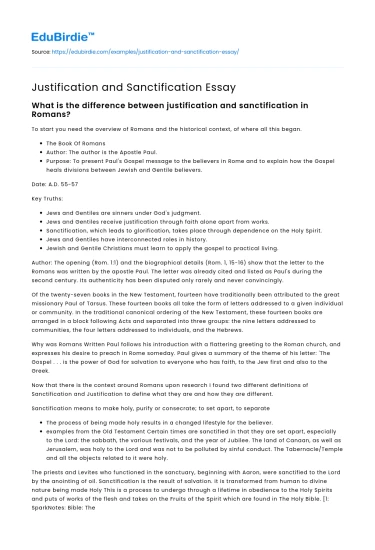Introduction
The theological concepts of justification and sanctification have long been central tenets within Christian doctrine, offering profound insights into the nature of salvation and the believer's journey towards holiness. Justification, often seen as a legal declaration by God that a sinner is righteous through faith in Christ, contrasts yet complements sanctification, which involves the process of becoming holy and conformed to the image of Christ. These concepts, though distinct, are inextricably linked and provide a comprehensive understanding of the transformative power of grace in a believer's life. This essay aims to explore the nuances of justification and sanctification, examining their theological significance, practical implications, and how they are perceived within various Christian traditions. By addressing counter-arguments and integrating scholarly perspectives, the discussion will underscore the harmony between these doctrines and their role in the believer's spiritual journey.
Understanding Justification: A Theological Perspective
Justification is often described as the cornerstone of Protestant theology, particularly emphasized in the writings of Martin Luther and John Calvin. It is understood as a forensic act of God, whereby a sinner is declared righteous solely on the basis of faith in Jesus Christ. This declaration is not based on any inherent merit or works of the individual but is entirely a result of God's grace. As articulated by the Apostle Paul, "For we maintain that a person is justified by faith apart from the works of the law" (Romans 3:28, NIV). This notion of justification emphasizes the unmerited favor of God that pardons sinners, imputing to them the righteousness of Christ.
Save your time!
We can take care of your essay
- Proper editing and formatting
- Free revision, title page, and bibliography
- Flexible prices and money-back guarantee
Critics, however, argue that justification by faith alone undermines the necessity of moral and ethical living, leading to antinomianism—the belief that Christians are released from the obligation of observing moral law. Yet, this critique is addressed by proponents who assert that genuine faith inevitably produces fruit in the form of good works. As James rightly emphasizes, "faith without deeds is dead" (James 2:26, NIV). Thus, justification, while a declarative act, is inherently linked to the transformative process that follows, preparing the ground for sanctification.
Transitioning to the concept of sanctification, it is essential to recognize how these theological constructs operate within a synergistic framework. While justification changes the believer's standing before God, sanctification involves the internal renewal and moral transformation of the believer's nature. This transition reflects a shift from a legal declaration to a lifelong process of spiritual growth and maturity.
The Process of Sanctification: Growth in Holiness
Sanctification is understood as the process by which believers are made holy, an ongoing work of the Holy Spirit that transforms their character and conduct to reflect the likeness of Christ. Unlike justification, which is instantaneous, sanctification is progressive, involving the believer's active participation alongside divine intervention. This dual aspect of sanctification is captured in Philippians 2:12-13, where Paul exhorts believers to "work out your salvation with fear and trembling, for it is God who works in you to will and to act in order to fulfill his good purpose" (NIV).
Sanctification encompasses both positional sanctification, which occurs at conversion, and progressive sanctification, which is the continual growth in grace and knowledge of Christ. The process involves the cultivation of virtues such as love, joy, peace, and patience, as outlined in Galatians 5:22-23. It also requires the mortification of sin and the pursuit of holiness, reflecting a dynamic interplay between divine enablement and human responsibility.
Critically, some may contend that the emphasis on sanctification could lead to legalism, where the focus shifts from grace to human effort. However, this concern is mitigated by the understanding that sanctification is rooted in the work of the Holy Spirit, who empowers believers to live righteous lives. This perspective underscores the necessity of relying on divine strength rather than human effort alone, ensuring that sanctification is a reflection of God's work in the life of the believer.
The intricate relationship between justification and sanctification is further elucidated in the context of their practical implications for Christian living. As believers grow in sanctification, they embody the reality of their justification, living out their declared righteousness in tangible ways. This ongoing transformation serves as a testament to the power of the gospel, reinforcing the harmony between these doctrines.
Conclusion
In conclusion, the doctrines of justification and sanctification are foundational to understanding the nature of salvation and the believer's transformation in the Christian faith. Justification, as a declarative act, affirms the believer's righteous standing before God, while sanctification involves the progressive journey towards holiness and Christlikeness. Though distinct, these doctrines are complementary, each playing a vital role in the believer's spiritual life. By addressing potential counter-arguments and integrating theological insights, this essay has highlighted the harmonious interplay between justification and sanctification, underscoring their significance in the believer's journey of faith. Ultimately, these doctrines not only affirm the transformative power of grace but also call believers to a life of holiness, reflecting the character of Christ in a broken world.






 Stuck on your essay?
Stuck on your essay?

